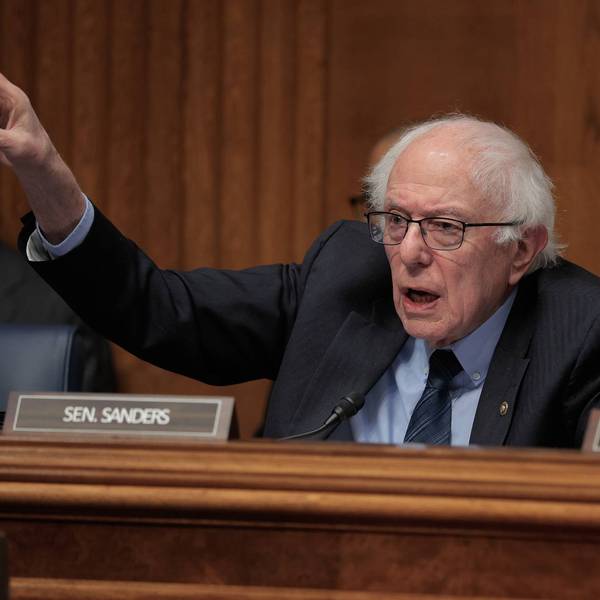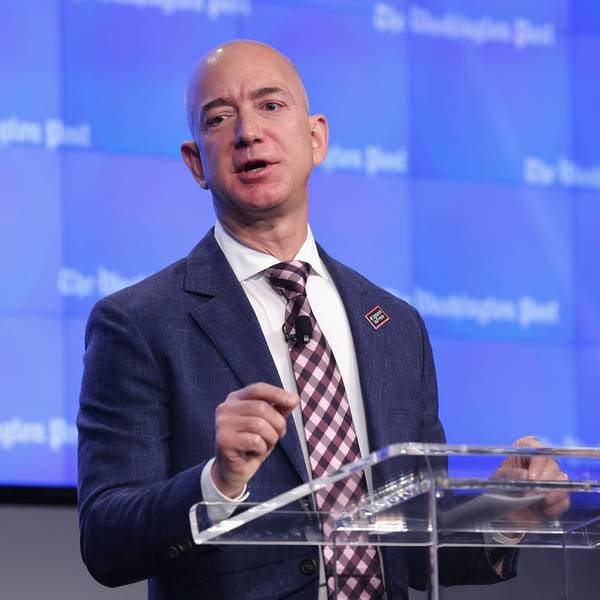
With local and independent news outlets under threat from all sides, write Pickard, a "reformist vision that recognizes news and information as public goods--vital necessities for our collective welfare that the market can't provide--calls for a holistic approach." (Photo: Shutterstock)
Post-Election We Need a Bold Plan for Journalism
Ultimately, the market won't save us. Nor will rich benefactors. We need a systemic fix, a public media option that's dedicated to universal service in its true meaning: all Americans must have access to high quality news and information.
Revitalizing our democracy for what hopefully will be a post-Trump era requires rebuilding core institutions, including news and information systems. Local journalism, which binds communities together and sustains civic health, has been utterly devastated in recent years--a death spiral that has only accelerated during the pandemic.
Research shows a broad range of social harms associated with losing local journalism, including more corruption, greater polarization, lower levels of political knowledge, and less voter participation. It also creates a vacuum for partisan-driven misinformation--what some have called "pink slime journalism"--to run rampant. These growing "news divides" disproportionately hurt poor people and vulnerable communities.
"In the post-pandemic future, we can't simply revert back to the status quo and expect the market to steer us into calmer waters. This old way of thinking is suicidal."
With news deserts rapidly expanding across the U.S., it's increasingly clear that local journalism has no profitable future. But democracy shouldn't depend on profits. We need a bold recovery plan that doesn't rely on market solutions. What we need, then, is to build up a public sector for news.
What might this look like? Many specific details are for engaged citizens and journalists to determine for themselves, but the baseline goal should be universal: a well-funded, multimedia newsroom in every community. To ensure independence, these newsrooms should be democratically controlled by journalists (not absentee owners), look like the communities they serve, and be directly accountable to local residents.
How do we get there? A two-pronged approach that I outline in my recent book would first de-commercialize and then democratize our news media. Most immediately, we should rescue good assets from bad owners and unhook journalism from the commercial rat race that's driving newspapers to their ruin. We could transition dying papers into nonprofit entities, either as part of a broader public media system or as stand-alone independent local institutions--perhaps as municipal newspapers.
But while nonprofit, privately-owned newspapers are a step in the right direction, we also need public options. We can allocate the necessary resources to expand our public media in multiple ways, including by taxing digital platforms, pooling philanthropic contributions, and repurposing federal expenditures such as the Pentagon's public relations budget.
The government must also ensure local control and independence. One way is to allocate subsidies via tax vouchers for individuals to decide for themselves how to fund their local media. We also can harness the power of already-existing public infrastructures such as libraries, universities, and post offices to empower local communities to create their own media.
The Trump administration's attacks have brought much-needed attention to the plight of USPS. But a basic lesson from postal history deserves more attention. The founders of the American republic--despite their flaws--weren't in thrall to market fundamentalism. They didn't assume that commerce alone would provide for our communication infrastructures. Instead, they heavily subsidized them, privileging democracy over fiscal concerns. A stark counterexample was the Confederacy's postal system during the Civil War, whose strict mandate on achieving economic self-sufficiency proved disastrous.
Market fundamentalism still exerts too much influence over our policymaking. But promising signs are emerging that our elected officials see journalism's collapse as something they must confront. Several pieces of legislation over the past year call for various kinds of subsidies. Lawmakers could expand on these initiatives in the next Congress.
But while stopgap measures are important to stanch journalism's bleeding, we mustn't prop up failing commercial models. In the post-pandemic future, we can't simply revert back to the status quo and expect the market to steer us into calmer waters. This old way of thinking is suicidal.
"Self-government is impossible without a functioning press."
Ultimately, the market won't save us. Nor will rich benefactors. We need a systemic fix, a public media option that's dedicated to universal service in its true meaning: all Americans must have access to high quality news and information. The informational redlining that's long excluded poor households and communities of color must stop.
A reformist vision that recognizes news and information as public goods--vital necessities for our collective welfare that the market can't provide--calls for a holistic approach. Along with producing the media that society needs, we must also guarantee access to publicly-subsidized broadband--what David Berman and I refer to as a "new deal for the digital age."
Meaningful participation in a democratic society necessitates adequate infrastructure for all Americans to receive and share essential information. During the pandemic, we've learned firsthand how shoddy American internet services remain for vast swaths of the country.
Ultimately, we must heed a lesson we all learned in school. Self-government is impossible without a functioning press. Rebuilding--and reinventing--news and information systems from the ground up must be one of our first tasks following the 2020 election.
An Urgent Message From Our Co-Founder
Dear Common Dreams reader, The U.S. is on a fast track to authoritarianism like nothing I've ever seen. Meanwhile, corporate news outlets are utterly capitulating to Trump, twisting their coverage to avoid drawing his ire while lining up to stuff cash in his pockets. That's why I believe that Common Dreams is doing the best and most consequential reporting that we've ever done. Our small but mighty team is a progressive reporting powerhouse, covering the news every day that the corporate media never will. Our mission has always been simple: To inform. To inspire. And to ignite change for the common good. Now here's the key piece that I want all our readers to understand: None of this would be possible without your financial support. That's not just some fundraising cliche. It's the absolute and literal truth. We don't accept corporate advertising and never will. We don't have a paywall because we don't think people should be blocked from critical news based on their ability to pay. Everything we do is funded by the donations of readers like you. Will you donate now to help power the nonprofit, independent reporting of Common Dreams? Thank you for being a vital member of our community. Together, we can keep independent journalism alive when it’s needed most. - Craig Brown, Co-founder |
Revitalizing our democracy for what hopefully will be a post-Trump era requires rebuilding core institutions, including news and information systems. Local journalism, which binds communities together and sustains civic health, has been utterly devastated in recent years--a death spiral that has only accelerated during the pandemic.
Research shows a broad range of social harms associated with losing local journalism, including more corruption, greater polarization, lower levels of political knowledge, and less voter participation. It also creates a vacuum for partisan-driven misinformation--what some have called "pink slime journalism"--to run rampant. These growing "news divides" disproportionately hurt poor people and vulnerable communities.
"In the post-pandemic future, we can't simply revert back to the status quo and expect the market to steer us into calmer waters. This old way of thinking is suicidal."
With news deserts rapidly expanding across the U.S., it's increasingly clear that local journalism has no profitable future. But democracy shouldn't depend on profits. We need a bold recovery plan that doesn't rely on market solutions. What we need, then, is to build up a public sector for news.
What might this look like? Many specific details are for engaged citizens and journalists to determine for themselves, but the baseline goal should be universal: a well-funded, multimedia newsroom in every community. To ensure independence, these newsrooms should be democratically controlled by journalists (not absentee owners), look like the communities they serve, and be directly accountable to local residents.
How do we get there? A two-pronged approach that I outline in my recent book would first de-commercialize and then democratize our news media. Most immediately, we should rescue good assets from bad owners and unhook journalism from the commercial rat race that's driving newspapers to their ruin. We could transition dying papers into nonprofit entities, either as part of a broader public media system or as stand-alone independent local institutions--perhaps as municipal newspapers.
But while nonprofit, privately-owned newspapers are a step in the right direction, we also need public options. We can allocate the necessary resources to expand our public media in multiple ways, including by taxing digital platforms, pooling philanthropic contributions, and repurposing federal expenditures such as the Pentagon's public relations budget.
The government must also ensure local control and independence. One way is to allocate subsidies via tax vouchers for individuals to decide for themselves how to fund their local media. We also can harness the power of already-existing public infrastructures such as libraries, universities, and post offices to empower local communities to create their own media.
The Trump administration's attacks have brought much-needed attention to the plight of USPS. But a basic lesson from postal history deserves more attention. The founders of the American republic--despite their flaws--weren't in thrall to market fundamentalism. They didn't assume that commerce alone would provide for our communication infrastructures. Instead, they heavily subsidized them, privileging democracy over fiscal concerns. A stark counterexample was the Confederacy's postal system during the Civil War, whose strict mandate on achieving economic self-sufficiency proved disastrous.
Market fundamentalism still exerts too much influence over our policymaking. But promising signs are emerging that our elected officials see journalism's collapse as something they must confront. Several pieces of legislation over the past year call for various kinds of subsidies. Lawmakers could expand on these initiatives in the next Congress.
But while stopgap measures are important to stanch journalism's bleeding, we mustn't prop up failing commercial models. In the post-pandemic future, we can't simply revert back to the status quo and expect the market to steer us into calmer waters. This old way of thinking is suicidal.
"Self-government is impossible without a functioning press."
Ultimately, the market won't save us. Nor will rich benefactors. We need a systemic fix, a public media option that's dedicated to universal service in its true meaning: all Americans must have access to high quality news and information. The informational redlining that's long excluded poor households and communities of color must stop.
A reformist vision that recognizes news and information as public goods--vital necessities for our collective welfare that the market can't provide--calls for a holistic approach. Along with producing the media that society needs, we must also guarantee access to publicly-subsidized broadband--what David Berman and I refer to as a "new deal for the digital age."
Meaningful participation in a democratic society necessitates adequate infrastructure for all Americans to receive and share essential information. During the pandemic, we've learned firsthand how shoddy American internet services remain for vast swaths of the country.
Ultimately, we must heed a lesson we all learned in school. Self-government is impossible without a functioning press. Rebuilding--and reinventing--news and information systems from the ground up must be one of our first tasks following the 2020 election.
Revitalizing our democracy for what hopefully will be a post-Trump era requires rebuilding core institutions, including news and information systems. Local journalism, which binds communities together and sustains civic health, has been utterly devastated in recent years--a death spiral that has only accelerated during the pandemic.
Research shows a broad range of social harms associated with losing local journalism, including more corruption, greater polarization, lower levels of political knowledge, and less voter participation. It also creates a vacuum for partisan-driven misinformation--what some have called "pink slime journalism"--to run rampant. These growing "news divides" disproportionately hurt poor people and vulnerable communities.
"In the post-pandemic future, we can't simply revert back to the status quo and expect the market to steer us into calmer waters. This old way of thinking is suicidal."
With news deserts rapidly expanding across the U.S., it's increasingly clear that local journalism has no profitable future. But democracy shouldn't depend on profits. We need a bold recovery plan that doesn't rely on market solutions. What we need, then, is to build up a public sector for news.
What might this look like? Many specific details are for engaged citizens and journalists to determine for themselves, but the baseline goal should be universal: a well-funded, multimedia newsroom in every community. To ensure independence, these newsrooms should be democratically controlled by journalists (not absentee owners), look like the communities they serve, and be directly accountable to local residents.
How do we get there? A two-pronged approach that I outline in my recent book would first de-commercialize and then democratize our news media. Most immediately, we should rescue good assets from bad owners and unhook journalism from the commercial rat race that's driving newspapers to their ruin. We could transition dying papers into nonprofit entities, either as part of a broader public media system or as stand-alone independent local institutions--perhaps as municipal newspapers.
But while nonprofit, privately-owned newspapers are a step in the right direction, we also need public options. We can allocate the necessary resources to expand our public media in multiple ways, including by taxing digital platforms, pooling philanthropic contributions, and repurposing federal expenditures such as the Pentagon's public relations budget.
The government must also ensure local control and independence. One way is to allocate subsidies via tax vouchers for individuals to decide for themselves how to fund their local media. We also can harness the power of already-existing public infrastructures such as libraries, universities, and post offices to empower local communities to create their own media.
The Trump administration's attacks have brought much-needed attention to the plight of USPS. But a basic lesson from postal history deserves more attention. The founders of the American republic--despite their flaws--weren't in thrall to market fundamentalism. They didn't assume that commerce alone would provide for our communication infrastructures. Instead, they heavily subsidized them, privileging democracy over fiscal concerns. A stark counterexample was the Confederacy's postal system during the Civil War, whose strict mandate on achieving economic self-sufficiency proved disastrous.
Market fundamentalism still exerts too much influence over our policymaking. But promising signs are emerging that our elected officials see journalism's collapse as something they must confront. Several pieces of legislation over the past year call for various kinds of subsidies. Lawmakers could expand on these initiatives in the next Congress.
But while stopgap measures are important to stanch journalism's bleeding, we mustn't prop up failing commercial models. In the post-pandemic future, we can't simply revert back to the status quo and expect the market to steer us into calmer waters. This old way of thinking is suicidal.
"Self-government is impossible without a functioning press."
Ultimately, the market won't save us. Nor will rich benefactors. We need a systemic fix, a public media option that's dedicated to universal service in its true meaning: all Americans must have access to high quality news and information. The informational redlining that's long excluded poor households and communities of color must stop.
A reformist vision that recognizes news and information as public goods--vital necessities for our collective welfare that the market can't provide--calls for a holistic approach. Along with producing the media that society needs, we must also guarantee access to publicly-subsidized broadband--what David Berman and I refer to as a "new deal for the digital age."
Meaningful participation in a democratic society necessitates adequate infrastructure for all Americans to receive and share essential information. During the pandemic, we've learned firsthand how shoddy American internet services remain for vast swaths of the country.
Ultimately, we must heed a lesson we all learned in school. Self-government is impossible without a functioning press. Rebuilding--and reinventing--news and information systems from the ground up must be one of our first tasks following the 2020 election.

